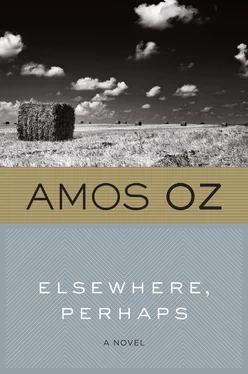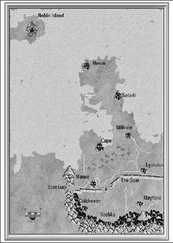Grisha Isarov's prestige took a mighty leap that night. Among the senior officers he discovered an old comrade from the days of the Jewish Brigade. They fell on each other and exchanged hearty bear hugs, while the youngsters looked on in amazement. Grisha was even allowed to join the officers for the last few minutes of their conference, but unfortunately he did not manage to adapt his voice to their hushed tones but expressed his opinions at the top of his voice. The seven Isarov children, including Dafna, basked in a halo of glory that night.
On Sunday another small group of officers visited us, this time a group of lower rank. They inspected the shelters and the trenches, and looked rather apprehensively at the telephone wire that emerged from the kibbutz office and ran along the lawn on a series of rough wooden poles. One of them detached himself from the group to peer into the surgery and examine the nurse's supplies. Finally, they sat down at an isolated table in the dining hall to jugs of fruit juice and baskets of fruit. They invited Tsvi Ramigolski, the secretary of the kibbutz, to join them, together with Grisha Isarov, with his tousled mustache and his wading boots, and two or three younger men, such as Tomer Geva, who had served as officers in the army.
What a pity that the latter haughtily refused to pass on to us the gist of that fascinating conversation. In reply to your questions they merely shook their heads secretively. If you persisted and pestered them and swore yourself to secrecy, they relented enough to dismiss you with a half-sentence such as:
"It's going to be hot."
Oren's gang, too, in their usual sly way, were prepared to inform you:
"It's going to be a big show."
The youngest group, Gai and his friends, promptly translated the hints into action. On Monday evening the kibbutz yard was full of shouting and bustle, scampering footsteps and sounds of battle, and at nightfall the little hill that faces the kibbutz gates to the west was stormed, and the Israeli flag planted on it with great pomp and circumstance.
Even to someone like ourselves, far removed from military matters, it was perfectly obvious that something was afoot, in the stifling heat of the hamsin. Grisha Isarov, who was responsible for security, had already taken several hours off his work in the fish ponds and enlisted the help of two or three other members in cleaning out and putting straight the shelters and the trenches.
Grisha Isarov, a man of forty or so, was not one of the founders of our kibbutz. He joined us two years before the Second World War. When war broke out, he volunteered for the Jewish Brigade and reached the rank of sergeant major in Her Majesty's Armed Forces. After the war he returned to the kibbutz, heavier, mustached, and with an inexhaustible fund of anecdotes. No wonder that Esther Klieger, a nursery-school teacher with an amazing knack for carving abstract sculptures out of tree stumps, succumbed to his charms. Grisha did not rest quietly for long. Within three or four months of returning from the war in Italy, he had succeeded in getting Esther with child, marrying her, and joining the underground army. His exploits as a company commander in the struggle for independence he will be happy to recount to you till midnight, and if he is busy in the Fish ponds, then you can hear the stories either from his plump daughter Dafna or from any one of his six other children, who are all as heavily built as their father and all marked, boys and girls alike, with a fine down on their upper lip, which Grisha jokingly refers to as the badge of his unit.
If it had not been for a certain unfortunate incident, Grisha might have risen to high rank in the army; he might have joined the group of senior officers that Friday night in his own right and not as a favor. The details of the misdemeanor that put a premature end to Grisha Isarov's promising military career are not known for certain. According to our old ally, gossip, it concerned a punishment inflicted on one of the men under his command, which exceeded the bounds of military regulations. According to Grisha himself, the modern Israeli army is better suited to tin soldiers than to fighting men. A man of his caliber would not waste his life and talents in an army of halberdiers and gay hussars commanded by chocolate-box admirals.
Anyway, a couple of years after the end of the War of Independence Grisha returned to Metsudat Ram for good and shouldered the arduous responsibility of the fish ponds. His bluff, hearty manner endears him to all around him. His numerous progeny, too, give rise to good-humored jests. Grisha Isarov also manages the security of the kibbutz with wholehearted enthusiasm, though not without a hint of frivolity. Occasionally, for instance, he straightens his massive back, lays down the fish nets, and hurls vehement Arabic curses at the enemy positions. Or sometimes he sways his hips at them like an enormous belly dancer and gives a hideous laugh. But he is not the kind of man to overlook such trivial tasks as repairing a torn stretcher, taking stock of the ammunition, or his recent effort of cleaning out and putting straight the shelters and trenches.
It was a difficult period for Herzl Goldring. He hardly had time to play his accordion. Because of the heat the plants needed to be watered at least twice as often as normally, and even that did little good. There were not enough rubber hoses for the job. Time and again he had pestered Yitzhak Friedrich, the treasurer, for a small sum to buy plastic hose pipes, but each time Frederick the Great had fobbed him off with excuses; either it's the beginning of the month, and how can we tell whether we'll have enough cash to see it out, or else it's the end of the month, and who has cash to lay out at the end of the month. If he'd asked for a large amount, he'd have got it by now. But if you need a small sum for a vital purpose, they fob you off with one excuse after another. It's symptomatic of the whole place. So Herzl Goldring grumbles to his wife Nina as they sit on their little veranda in the evening, with the light out.
All round the kibbutz grounds you see plants drooping, withering, fainting with the heat. Before you've fixed up the hose to water the flowers on one side of the kibbutz, those on the other side have started to wilt. And Herzl Goldring is a man who feels physical pain at the sight of a dying plant, because he loves his work.
Herzl Goldring's dedication to his flower beds is a by-word in the kibbutz. He belongs to the German faction, and in his heart of hearts he has never managed to reconcile himself to the ways of the Russians. They're so inconsistent. One day they're all sympathy and plead to be allowed to help you after their work, laying and weeding the lawns; another day they turn a deaf ear to all your requests and entreaties and empty a barrowload of building rubble on the same lawn that they so eagerly volunteered to help make. True, Herzl's wife is also a Russian. But Nina is unique among her countrywomen for her reserved manner. For many years she has borne the burden of managing the kitchen stores, generating a spirit of economy, cleanliness, and open-mindedness. Like her husband, she is gifted with a fine aesthetic sense. Their room, tastefully furnished in a European style, is gleaming and spotless. True, the pretty rugs, bookcases, and chest of drawers were acquired with money that Herzl received from the German government in reparation for his family's lost fortune, but he should not be judged harshly on this account. The money he received was paid over almost in its entirety to Yitzhak Friedrich. We must not criticize him for keeping a small sum to furnish his home and buy himself an accordion. What else was there left in his life? Their only daughter had died in her infancy of diphtheria. Being childless, they naturally wanted to make the most of their modest home. It was a venial human weakness.
Читать дальше












